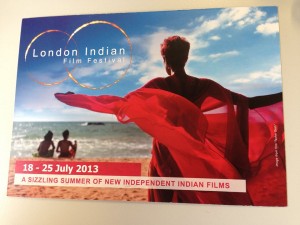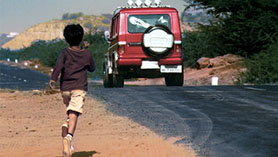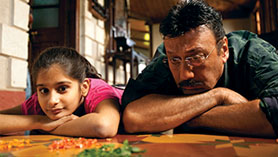 Opening tomorrow night and running through July 25th, is the cool London Indian Film Festival. The festival looks Beyond Bollywood and introduces amazing independent Indian films to the UK and has a world of riches for the audience this year. Check out what the festival director Cary Rajinder Sawhney told us in this fabulous in-depth interview about the movies and more of the London Indian Film Festival.
Opening tomorrow night and running through July 25th, is the cool London Indian Film Festival. The festival looks Beyond Bollywood and introduces amazing independent Indian films to the UK and has a world of riches for the audience this year. Check out what the festival director Cary Rajinder Sawhney told us in this fabulous in-depth interview about the movies and more of the London Indian Film Festival.
All about London Indian Film Festival
I have been working on the BFI London Film Festival for the last 17 years and one thing that struck me every year was that our films, Indian films, just weren’t getting any media attention, distributors weren’t picking them up, nobody was talking about them. The UK vision seem to be if it was Bollywood, then the Bollywood distributors would take care of it and it was anything else they did not understand it. What we have tried to do at LIFF is to platform these films for the first time in London. That they are films that should be seen – they have strong scripts and they are great films.
The fact is that world is waking up to Indian cinema. The point of our festival is to break these stereotypes that Indian cinema isn’t just Bollywood and I think people are really getting it now. Four years on, people in Britain are really starting to get it. You know, when we started talking to critics four years ago they said, ‘Oh we don’t really do Bollywood.’ Now they kind of know what we are talking about; we don’t have to explain it. They know what we say when we say Indian independent cinema. They can kind of relate it to the Cohen brothers or Tarantino, it’s like that kind of cinema and they get it now. That is a big change. I think that is one thing we have achieved, we have managed to get the media and the audiences to think about Indian cinema in a different way.
The thing is we have hit kind of the zeitgeist of the moment of this new cinema, which is coming out. Over the years I have seen these kind of films being experiments: they are not art house, they are not commercial, but these films are suddenly reaching their own and I think we have sort of helped in that process. We have actually been part of that process of bringing them to the world, which is quite exciting for our festival to have it to be such a moment of change. And also to be part of that moment of change, where, for example, directors like Anurag Kashyap are sort of breaking into Cannes and things like that. Both our opening and closing films were screened at Cannes Film Festival where they were both hailed.
We also have brought in a new audience. There are a lot of young Asians who actually don’t want to see Bollywood stuff because it is all to do with their parent’s generation. We are tapping into a new audience who really want to see something where they want to bring their English friends along and they want to see something that they feel proud and cool about. Not everybody is into what could be called “camp” in an English context. You know, Hindi cinema has its heart and its great family audience but we are aiming for the young kind of Metropolitan youth. And also younger Indians, who are here on mass, really want something that reminds them of home and so we have got films in different languages. We have our first Gujarati film this year, we have our first Pakistani film this year called Josh, so we are not doing India as India superior nation kind of thing, we are looking at India as our neighbors and friends.
 We try and show a range of different cinema, not just Hindi films but a range of different languages. Something that reflects modern India in all its diversity and richness. Ultimately, the most important thing is that they are great stories. They have to be world-class stories and films, that is ultimately the criteria or be doing something radically new and different.
We try and show a range of different cinema, not just Hindi films but a range of different languages. Something that reflects modern India in all its diversity and richness. Ultimately, the most important thing is that they are great stories. They have to be world-class stories and films, that is ultimately the criteria or be doing something radically new and different.
We have got a really smart savvy team of film professionals so we are reflecting a great product, which you will see. And then we know how to organize and deliver a kick ass film festival right across London. We also are touring to Bradford at the The National Media Museum and Glasgow at the Glasgow Film Theater, this year for the first time. So by popular interest we are actually spreading the festival to the UK and we are kind of distributing the films ourselves in a small and bizarre way. It is very exciting; it is our first foray into UK wide.
It is getting stronger every year. It is just growing and I have a fabulous PR team that is getting it out to the whole world, which is quite wonderful.
The Movies of LIFF 2013
This year is power-packed and probably our best year yet.
We are trying to profile more women directors this year. We have our first Pakistani film Josh. The director Iram is coming over and her Q and A discussion is going to be done by Kate Kinninmont of Women in Film & TV. So we are looking at films about women’s experiences. Of course, our closing night film, Bombay Talkies has a woman director. We have got very strong female leads in other films so it is quite nice to be able to reflect a more positive image of Indian and South Asian women and that in some small way reflects some of the experiences of women. So in a gentle way we are reflecting and focusing on women in a stronger way this year.
We have got great filmmakers. We have a Gujarati film called The Good Road, which is fabulous. It is about a family who are driving across the desert and the son just jumps out of the car to see a puppy and they leave him behind and then what happens is very interesting.
Director Hansal Mehta is coming over from India with his amazing film called Shahid. A very controversial film based on the true life story of the lawyer Shahid Azmi, who went into a radical group of militant Muslims, was jailed, became a lawyer in jail and then went on to fight the rights of the people, mainly Muslim people accused of being terrorists. His final case was the Bombay Terror attacks and then he was killed himself. It is quite a powerful film based on true story. This is a must see. It’s got some great young actors including Raj Kumar Yadav who is doing quite well in Indian at the moment.
 Then of course there is Nawazuddin Siddique, who is in both our closing night film and our opening night film Monsoon Shootout. Director Amit Kumar is flying over to introduce that film on stage and we have a whole load of VIPs that want to come see it as well. It is amazing. Monsoon Shootout is a film noir version of Sliding Doors. This cop is facing the moment where this villain is jumping over the fence and the cop has to decide whether or not to shoot or not to shoot him and in that moment what he decides has terrible and dramatic consequences on his life. The film follows those 3 different choices and how those three different stories could end. Riveting and quite horrifying. A stunning film. All set in the heavy monsoon where morality is up for grabs.
Then of course there is Nawazuddin Siddique, who is in both our closing night film and our opening night film Monsoon Shootout. Director Amit Kumar is flying over to introduce that film on stage and we have a whole load of VIPs that want to come see it as well. It is amazing. Monsoon Shootout is a film noir version of Sliding Doors. This cop is facing the moment where this villain is jumping over the fence and the cop has to decide whether or not to shoot or not to shoot him and in that moment what he decides has terrible and dramatic consequences on his life. The film follows those 3 different choices and how those three different stories could end. Riveting and quite horrifying. A stunning film. All set in the heavy monsoon where morality is up for grabs.
We have this amazing Punjabi version of The Graduate called BA Pass. It is about a Punjabi cougar who picks up a young teenager boy and then he falls in love and then she farms him out to all her lady friends. (Laughs) So it is a sexy full on film, which is definitely going too raise some eyebrows. That is kind of fun.
There is a Spanish film about India called Mapa, which is an unusual thing. We are doing a special National Health Service free screening for the film and the talk is about mental well being in the Spanish community and the Indian communities in London, which will be funded by the National Health Service. That is quite radical.
Then, of course we have the actor who seems to be getting better and better with each film – Jackie Shroff. His film won the audience award last year. And this year he is in a film called Life is Good. He plays a middle age postman who loses his mum and then he gets kind of adopted by this young girl who is missing her father and they become lifetime friends. It is a very beautiful story about intergenerational friendship. You immediately think older man, younger girl, you would think it is pervy but really is not! (Laughs) It is just about two people, two human beings forming a bond that lasts a lifetime. It is quite beautiful and gentle story, which is kind of on the edge in terms of story, as you would imagine, but it actually is just about that camaraderie between human beings.
We have Bright Day, which is a beautiful film that is a fabulous road movie across Rajasthan.
A Marathi film called Pune 52, which is has got one of our favorites Girish Kulkarni, who has come over the festival before. He is a Marathi actor and he plays the leading role of a film noir detective.
 Tasher Desh, is an amazing psychedelic serial retake of Tagore’s House of Cards story. Full on, My God, high, high, high, high surrealism! It is an amazing art romp with a fabulous cast. And it is by the director Q, which was made famous last year with the amazing Gandu. We had a full on show. It is the first time the BFI ever had a punk rock concert in the cathedral of cinema. We actually had a young girl from Bombay passing out in the middle of the rock concert because it was just too exciting. So we are back to shake the pillars of the cathedral of cinema again.
Tasher Desh, is an amazing psychedelic serial retake of Tagore’s House of Cards story. Full on, My God, high, high, high, high surrealism! It is an amazing art romp with a fabulous cast. And it is by the director Q, which was made famous last year with the amazing Gandu. We had a full on show. It is the first time the BFI ever had a punk rock concert in the cathedral of cinema. We actually had a young girl from Bombay passing out in the middle of the rock concert because it was just too exciting. So we are back to shake the pillars of the cathedral of cinema again.
LIFF Masterclass
Then we have the pièce de résistance, we have two big master classes. One by the great Adoor Gopalakrishnan who is the only filmmaker, other than Satyajit Ray who is the greatest world Indian filmmaker, ever been awarded the Sutherland Trophy by the British Film Institute. It is very rare that he comes to London so we are honoring him at BFI this Friday.
Then there is one with Irrfan Khan who has done everything, he is the one Indian film actor that has crossed through Hollywood, UK cinema, Bollywood, Hindi cinema and Indian art house cinema. He is in conversation with Asif Kapadia. It was Asif Kapadia’s Warrior that brought him to world attention and that film actually won a BAFTA and was very well regarded. So Irrfan will be in conversation with Asif Kapadia, the two old friends on stage so that should be a lovely Q and A.
We have also got special events and awards and we are having a special BAFTA industry talk. Quite a packed week that closes with Bombay Talkies.
When you first hear about the film, it is 4 of the top directors celebration of 100 years of Indian cinema, you think you are going to get classic Bollywood. But then, it is something very different from that but in a cool way and it seems like a perfect fit for the festival, but why did you choose Bombay Talkies to close LIFF?
I thought it was quite a radical, different viewpoint of what you would expect. Like you said, people were expecting a film with perhaps shots of old classic movies but I think what is nice about it is it is 4 different director stories about four different lovers of cinema as audiences and it is their take on Indian cinema. They are all great. I love Zoya Akhtar’s – it is a real delight. There are so many truisms of young people and sexuality in that film and about how when you are young you explore. You don’t always want to be the football star, sometimes girls want to be the football hero and boys want to be the Bollywood heroine. That is just the way it is. It doesn’t necessarily mean they are going to be straight or gay it means they are going be themselves. So, the fact is he wants to be Katrina Kaif. It is a lovely story; his sister supports him though a bit quiet (laughs) to make his dreams come true. It is a beautiful story. Very delicately told and I think it is very brave. I mean how many Hollywood films would show that? I think a film like that is taking chances with audiences and I think it shows the guts of the filmmakers involved. Anurag’s film is again about the idolization of Indian cinema. Then, of course Karan’s film about coming out. Dibakar’s film, which is the core that again, the idea that you have this dream and could spend your lifetime trying to get into the film industry and one day it falls on you. That is your moment, that is your golden 60 seconds of fame or whatever. That is your moment where dreams come true, you live that moment and that may be it maybe. But that is why millions and millions come to Bombay for just for that dream and that film is about one lonely man’s story about that, which is quite powerful.
 The thing is that film hasn’t been shown in the UK, it has only been shown in India. We are very excited and expecting it to sell out since it is the first UK screening.
The thing is that film hasn’t been shown in the UK, it has only been shown in India. We are very excited and expecting it to sell out since it is the first UK screening.
In fact, Irrfan Khan is going sell out. It actually looks like a number of events and screenings are going to sell out, which is quite exciting. We are expecting a great audience this year.
This is a one chance to see these films in London; nobody else is showing them. Also many people say they only see them in London at the Indian Film festival, they wouldn’t get a chance in India because they are not getting released or being shown or available. You know in Delhi or Bombay you probably wouldn’t see a Marathi film in the cinema or a Bengali film or a Kannada film they are crowded out by more commercial films. People say it is really cool we actually get to see films we couldn’t see at home.
Thoughts on Bollywood today
I think the interesting thing is because of the impact of the globalization of the market in terms of more Western films being in the multiplex cinema, the fact that you have got these whole kind of hybridized Indian independent films showing I think it is having a positive effect on Hindi cinema, where the scripts are getting better. A film like Kahaani, for example, is a really well made film. And film like Barfi! it is sort of a re-imagined classic film and you see a lot of films in it like Raj Kapoor scenes, but there is some really good acting there, they are quite strong. I was quite surprised by Priyanka Chopra who plays the young disabled girl. And it was nice with such a story {Spoiler ahead} that she is the one that gets the man (Laughs). That wouldn’t happen 10 years ago! Then you have got films like D-Day, which is kind of the homeland of Hindi cinema, which is the action epic. These sort of action and special effects film that only Bollywood and Hollywood could afford and do best. That kind of big action movie, so I supposed Bollywood is still producing that kind of big spectacle and the big explosions and the traumatic scenes so the market is there. There is just not one cinema; there is not just one audience in a country like India there is immeasurable diversity.
Also what is clear is that actors like Irrfan Khan and Nawazuddin Siddique are the new heroes. People want to see them; they have seen all the pretty white or wheatish boys. They want to see people who like everyday Indians but who are also great actors – they are believable it is not just dancing around – they can actually act. Some actors like Jackie Shroff are showing they can meet any challenge and showing they are great actors as well. What is interesting with this new appetite  multiplex generation of India they want to hail these new kind of heroes of cinema. These are possibly the new culture; these are the new heroes of the future. That is quite interesting and exciting.
multiplex generation of India they want to hail these new kind of heroes of cinema. These are possibly the new culture; these are the new heroes of the future. That is quite interesting and exciting.
So what can audiences expect to see when they come to LIFF?
These are films that will entertain you, and maybe make you think. They certainly will change your view on Indian cinema. They are films that might challenge you, they might shock you (laughs) in the case of BA Pass, but they certainly are going to make you think about India a different way and give you a new image of modern India in all its richness and diversity.









